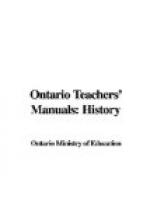It is important also to know the dates of certain events when we are studying the history of several countries, in order that we may consider together those events that are contemporary.
There are, of course, some dates that should be remembered because of the importance of the events connected with them, for example: 1066, 1215, 1492, 1603, 1688, 1759, 1776, 1789, 1841, 1867.
In the Junior Forms, because the pupils are still lacking in the “historical sense,” little emphasis need be put on the giving of dates. A few of the most important may be given in Form II, but it is very questionable if they have any significance to the pupils at this early stage.
CHAPTER IV
SPECIAL TOPICS
CURRENT EVENTS
The study of history should not end with what is contained in text-books, for the making of history never ceases. The study of current events will be found to be a very valuable element in history teaching. Teachers and pupils who are interested in the events of to-day are much more likely to be interested in the events of the past. A knowledge of current events will arouse curiosity in what led up to them, will suggest a motive for studying the past, and will often supply concrete examples for both history and civics. In fact, the teaching of civics may be based almost entirely on current events. (See Civics, p. 52 et seq.) The influence of a knowledge of current events on the study of history is very plainly seen to-day in the earnest and widespread effort to discover the causes of the war that is devastating Europe at the present time. History becomes real when pupils understand that what is happening now has its roots




